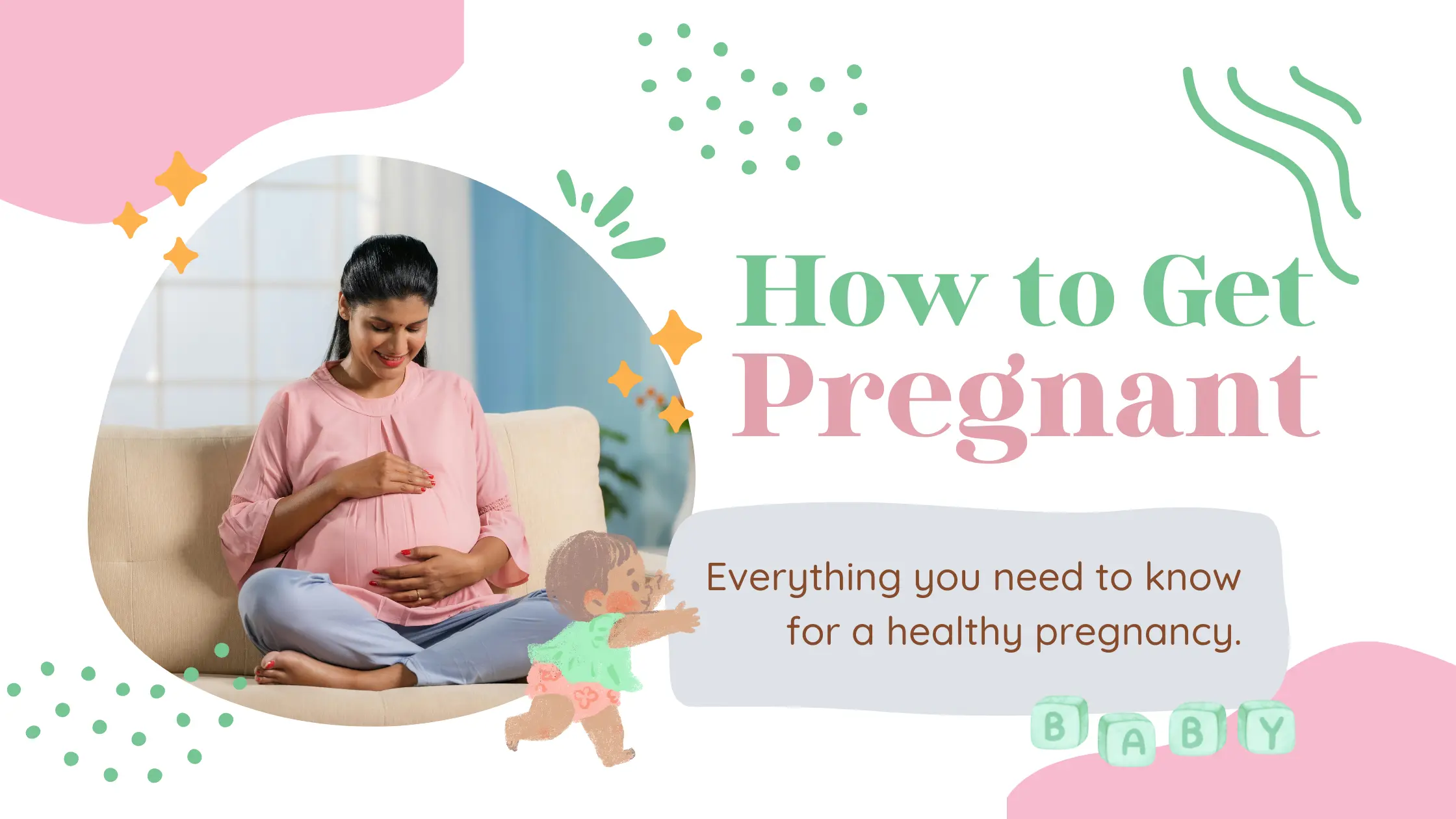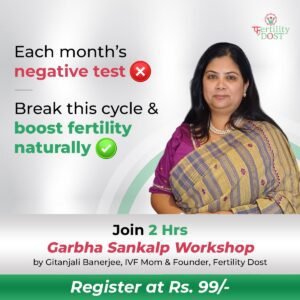How to Get Pregnant – A Complete Natural & Proven Guide for Couples
Pregnancy, Success Stories
For many couples, trying to conceive (TTC) is not just a biological goal – it’s an emotional journey filled with hope, excitement, and sometimes, heartache.
If you’ve been asking yourself questions like:
- How can I get pregnant naturally?
- What should I eat to conceive fast?
- Why am I not conceiving despite trying for months?
Then you’re not alone. Whether you’re planning for pregnancy for the first time or have been struggling with PCOS, low AMH, or unexplained infertility, there is a path forward.
In this detailed guide, you’ll discover practical, science-backed, and Ayurvedic tips on how to conceive naturally – and how the Garbha Sankalp Workshop can help you get there faster.
Understanding How Conception Works
Before you begin to take steps to think about how to get pregnant fast, it is helpful to understand the overview of the process of conception. Monthly an egg is released during ovulation. After ovulation, the egg will only be fertilized for a short time, about 12 to 24 hours after ovulation. Sperm may live in the female body for up to five days after intercourse. Therefore, if you have intercourse just before and on ovulation, the chances to conceive are the greatest. If you are asking “how can I get pregnant?” and asking “when can I get pregnant?”
Knowing about conception timing is the first step. If you are a woman having challenges such as PCOS, or AMH that is low, you may have greater concerns in how to plan in this timing, and may be using your physician for extra help with the life challenges that you may be facing.
Before we jump into the “how to get pregnant fast” part, it’s important to understand the basics.
Conception happens when:
- A mature egg is released from your ovary (ovulation).
- Sperm fertilizes the egg.
- The fertilized egg implants into the uterus lining.
The best time for pregnancy is during your fertile window – the 4-5 days before ovulation and the day of ovulation itself. For a 28-day cycle, ovulation often happens around day 14, but it varies from woman to woman.
Trying to Get Pregnant Fast? This Holistic Plan Helps – Enroll in the ₹99 Garbha Sankalp Workshop.
Join Garbha Sankalp Workshop Now
Fertility Tip 1 – Timing is Everything
One of the best pieces of advice to become pregnant is to monitor your ovulation. This can be done with ovulation predictor kits, fertility tracking apps, or just watching for physical signs such as changes in cervical mucus. The ideal time to become pregnant is during your fertile window, the 5–6 days before and including ovulation day.
Couples often do not realize how much timing matters. It is important to recognize that if you are thinking “I need to become pregnant this month,” then you will need to have intercourse during your fertile days. The Garbha Sankalp Workshop will teach you simple, accurate ways to identify your own personal fertile window so that you don’t miss an opportunity for your best chances.
One of the biggest reasons for not conceiving is mistimed intercourse.
- Track ovulation naturally using basal body temperature, cervical mucus changes, or ovulation predictor kits.
- The “fertile window” is key – aim for intimacy every alternate day during this period.
- If you’re wondering “When can I get pregnant?”, remember: sperm can survive up to 5 days in the female body, but an egg lives for only 12–24 hours after ovulation.
Fertility Tip 2 – Nourish Your Body for Fertility

Your diet is a critical component of your reproductive health. If you have PCOS, you may find that a PCOS diet rich in whole grains, lean proteins, healthy fats, and low-glycemic index foods is helpful for regulating your hormones and improving ovulation. If you’re just trying to conceive in general, you will want to include foods that are good sources of folate, iron, zinc, and antioxidants. Some of the best sources are leafy green veggies, eggs, nuts, seeds, and colorful fruits. If you’re wanting to know “what to eat to fall pregnant fast,” the answer is to focus on eating foods that are nutrient dense, maintain your blood sugar, and support your egg quality. You will get a customized fertility diet plan created by experts, that includes specific food to eat in PCOS, for better odds of becoming pregnant, when you attend the Garbha Sankalp Workshop.
If you have PCOS, insulin resistance, or hormonal imbalance, the right nutrition can make a difference.
What to Eat to Fall Pregnant Fast
- Fresh fruits & vegetables – especially leafy greens for folic acid.
- Whole grains – brown rice, oats, quinoa.
- Healthy fats – ghee, olive oil, nuts, seeds.
- Protein-rich foods – eggs, fish, lentils, paneer.
- Iron-rich foods – spinach, beetroot, dates.
PCOS Diet Plan
If you have PCOS and want to know “how to get pregnant fast with PCOS”, focus on:
- Low GI foods (avoid refined sugar & white carbs).
- Balanced meals with complex carbs, lean protein, and good fats.
- Cinnamon, fenugreek seeds, and flaxseeds for hormone balance.
Fertility Tip 3 – Balance Your Hormones Naturally
Hormonal imbalance is one of the major causes for a failure to conceive, hormonal level imbalance is especially impactful for conditions like PCOS, and thyroid disorders. Regulating your hormones naturally means trying to manage stress, prioritize sleep, get exercise, and plan strategic nutritional intake. Yoga to get pregnant is a great option. Yoga improves blood flow to reproductive organs and lower stress, while having some nourishing elements to balance hormones. Supta Baddha Konasana (Reclined Bound Angle) and Setu Bandhasana (Bridge Pose) are both restorative and oppressively powerful. In the Garbha Sankalp Workshop, we illustrate fertility focused yoga and lifestyle practices that helps to balance cycles and encourage ovulation.
Hormonal imbalance is a major reason for not conceiving Along with diet:
- Yoga to get pregnant – poses like Supta Baddha Konasana, Setu Bandhasana, and Viparita Karani improve pelvic blood flow.
- Stress reduction – meditation, journaling, deep breathing.
- Adequate sleep – 7–8 hours to support healthy ovulation.
Fertility Tip 4 – Understanding AMH & Fertility Health
AMH (Anti-Müllerian Hormone) levels provide a good indication of your ovarian reserve—the number of eggs remaining. What’s considered a healthy AMH level for pregnancy varies by age, but generally, 1.0–3.5 ng/ml is in the “normal” range for fertility. Low AMH does not equal that you cannot conceive, it indicates you might need to move quickly and more focus on egg quality. Our workshop includes information about AMH, egg health, and fertility preservation strategies, so you understand your current standing and how to possibly improve your chances.
Your AMH (Anti-Müllerian Hormone) level indicates your ovarian reserve (egg count).
- Healthy AMH level for pregnancy: usually 1.0–4.0 ng/mL.
- Low AMH doesn’t mean no pregnancy – it means you need a targeted approach (diet, supplements, and timing).
Fertility Tip 5 – When to Seek Medical Help?

If you have been trying for more than 1 year (or 6 months if you are over the age of 35), it is time to call a fertility specialist. Common pregnancy treatments include ovulation induction, IUI, and IVF. The success rate of IVF depends on many factors such as age, AMH level, and baseline health conditions. The Garbha Sankalp Workshop is act as a bridge between “trying naturally” and “moving to treatments,” as it will help you prepare your body for conception, whether naturally or medical intervention, so you can get better results in a shorter amount of time.
If you’ve been trying for 12 months (or 6 months if you’re over 35) without success, consult a fertility expert.
Common reasons for not conceiving include:
- Ovulation disorders (PCOS, thyroid issues).
- Low AMH or poor egg quality.
- Low sperm count or motility.
- Blocked fallopian tubes.
Pregnancy treatment options include ovulation induction, IUI, IVF, and donor programs.
But remember – the IVF success rate improves significantly when you prepare your body and mind beforehand.
The Garbha Sankalp Workshop – Your Step-by-Step Fertility Roadmap
Unlike generic advice, Garbha Sankalp Workshop provides you with a structured action plan to use over the course of eight weeks for your body, lifestyle and health and fertility goals. It incorporates modern scientific principles with Ayurveda, diet, yoga, and emotional support in your journey of improving your chances of conceiving naturally or being well prepared for any assisted gestation treatment providers. The size of the issue is also useful for PCOS, low AMH, and irregular cycles and for those with unexplained infertility, making it a particularly attractive program for women who want real solutions with actionable steps rather than another random tip found on the internet.
While the internet is full of pregnancy planning tips, what most couples need is personalized guidance.
That’s where the Garbha Sankalp Workshop comes in.
This 8-week program (now available as recorded sessions) is designed for couples who want:
- A clear fertility plan tailored to their body type and condition.
- A PCOS-friendly diet plan for natural conception.
- Yoga and meditation routines to improve reproductive health.
- Emotional support to stay motivated and stress-free.
It blends Ayurveda, nutrition, and modern fertility science – giving you a proven 2-month formula to boost your chances of conception naturally.
Fertility Dost’s Real-Life Success Story
Meet Meera, who was a 32-year-old woman with PCOS and irregular periods. For years, she struggled and failed with different treatment plans, until she finally made the decision to join the Garbha Sankalp Workshop. After beginning the diet plan, fertility yoga, and ovulation tracking that Garbha Sankalp suggests, she was able to conceive naturally within four months. She was a success story and the ideal proof that if you follow the right plan, you could achieve your dream of becoming a mother sooner than you thought.
Another participant, Ritu, had been trying for 4 years to conceive with PCOS and low AMH, and the doctors had suggested IVF, which she didn’t want to do. After joining Garbha Sankalp, she followed the diet, yoga, and stress management program and was able to conceive naturally in less than 3 months, which was a dream she never thought would happen for her.
Stories like Ritu’s are why this workshop has helped thousands of couples take control of their fertility journey.
FAQs – Answering Your Most Searched Questions
Q1. How can I conceive fast?
Track ovulation, eat a fertility-friendly diet, maintain a healthy weight, and reduce stress.
Q2. I need to get pregnant this month – is it possible?
Yes, if your cycle is regular and you have no major fertility issues, timing intercourse during your fertile window can make it possible.
Q3. How to get pregnant fast with PCOS?
Follow a PCOS diet plan, include daily exercise and yoga, track ovulation, and manage insulin resistance.
Q4. What is the best time for pregnancy?
2–3 days before ovulation and on the day of ovulation.
Q5. What should I eat for pregnancy planning?
Iron-rich foods, folic acid sources, protein, and healthy fats are essential.
Plan Your Next Step to Motherhood
Becoming pregnant is a combination of timing, health, and mindset. While tips about eating the right foods, tracking ovulation, and fertility yoga can help even more, just having a clear plan can ensure you are doing the right things at the right time. The Garbha Sankalp Workshop is here to provide a step-by-step succession plan so you can stop guessing what to do and just do it. If you are ready to take control of your fertility path, join today and give yourself the best opportunity to conceive as naturally as possible, and with confidence!
It’s about preparing your body, mind, and soul. If you’ve been searching for “tips to get pregnant” or “how to conceive naturally” and feel overwhelmed, remember – you don’t have to do this alone.
The Garbha Sankalp Workshop gives you the tools, guidance, and emotional support you need to increase your chances of pregnancy – naturally and confidently.
💛 Take the first step today: Connect us to Join the Garbha Sankalp Workshop








Your Comment Is Valuable For Us
Thanks For Your Feedback.